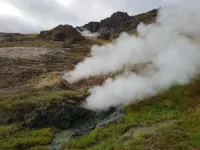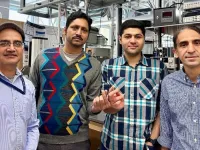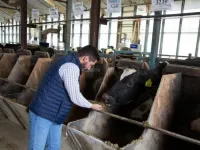(Press-News.org) Warmer soils harbour a greater diversity of active microbes, according to a new study from researchers at the Centre for Microbiology and Environmental Systems Science (CeMESS) at the University of Vienna. The study, published in Science Advances, represents a significant shift in our understanding of how microbial activity in the soil influences the global carbon cycle and possible feedback mechanisms on the climate. Until now, scientists have assumed that higher soil temperatures accelerate the growth of microbes, thus increasing the release of carbon into the atmosphere. However, this increased release of carbon is actually caused by the activation of previously dormant bacteria.
"Soils are Earth's largest reservoir of organic carbon," states Andreas Richter, lead author of the study and professor at the Centre for Microbiology and Environmental Systems Science. Microorganisms silently dictate the global carbon cycle, breaking down this organic matter thereby releasing carbon dioxide. As temperatures rise – a guaranteed scenario under climate change–microbial communities are thought to emit more carbon dioxide, further accelerating climate change in a process known as soil carbon-climate feedback.
"For decades, scientists have assumed that this response is driven by increased growth rates of individual microbial taxa in a warmer climate," explains Richter. In this study, the researchers visited a subarctic grassland in Iceland that has undergone over half a century of geothermal warming, resulting in elevated soil temperatures compared to surrounding areas. By collecting soil cores and using cutting-edge isotope probing techniques, the team identified active bacterial taxa, comparing their growth rates at both ambient and elevated temperatures, the latter being 6 °C higher.
"We saw that more than 50 years of consistent soil warming increased microbial growth at the community level," says Dennis Metze, PhD student and primary author of the study. "But remarkably, the growth rates of microbes in warmer soils were indistinguishable to those at normal temperatures." The pivotal difference lay in the bacterial diversity: Warmer soils harboured a more varied array of active microbial taxa.
Predicting soil microbial activities in a future climate
"Understanding the complexities of the soil microbiome's reaction to climate change has been a considerable challenge, often rendering it a 'black box' in climate modeling," adds Christina Kaiser, associate professor at the Centre. This new finding transcends the traditional focus on community-aggregated growth, setting the stage for more accurate predictions of microbial behavior and its consequent effects on carbon cycling in the evolving climate scenario. The insights gained from this study illuminate the diverse microbial responses to warming and are vital for forecasting the soil microbiome's impact on future carbon dynamics.
END
Global warming increases the diversity of active soil bacteria
New findings enable more accurate prediction of the carbon cycle
2024-02-23
ELSE PRESS RELEASES FROM THIS DATE:
Patient mindset training helps care teams
2024-02-23
A new study from Stanford University, published Jan. 19 in Patient Education and Counseling, evaluates the effectiveness of patient mindset training on provider learning and behavior.
Past research shows that what patients think, believe, or expect regarding medical care can influence care outcomes. Patients also have better outcomes when they have more adaptive mindsets about their treatments (e.g., “this treatment will be effective”), their bodies (e.g., “my body is capable”), their illnesses (e.g. “diabetes is manageable”), and their care team (e.g., “I am in good hands”). ...
Dual-energy harvesting device could power future wireless medical implants
2024-02-23
UNIVERSITY PARK, Pa. — Implantable biomedical devices — like pacemakers, insulin pumps and neurostimulators — are becoming smaller and utilizing wireless technology, but hurdles remain for powering the next-generation implants. A new wireless charging device developed by Penn State scientists could dramatically improve powering capability for implants while still being safe for our bodies, the researchers said.
The new device can harvest energy from magnetic field and ultrasound sources simultaneously, converting this energy to electricity to power implants, the scientists reported in the journal Energy & Environmental ...
Study: ‘Hexaplex’ vaccine aims to boost flu protection
2024-02-23
BUFFALO, N.Y. – Recombinant protein vaccines, like the Novavax vaccine used to fight COVID-19, offer several advantages over conventional vaccines.
They’re easy to precisely produce. They’re safe, and potentially more effective. And they could require smaller doses.
Because of these traits, there is much interest in developing recombinant influenza vaccines. To date, however, the Food and Drug Administration has approved only one such vaccine.
A University at Bufalo-led research team hopes to add to that number. It is developing a new recombinant flu vaccine – described ...
New structural insights could lead to mechanical enhancement in alloys
2024-02-23
UNIVERSITY PARK, Pa. — A new class of metallic materials with potential applications in airplane turbines, nuclear reactors and equipment for space exploration can withstand extreme temperatures and resist fractures, but scientists haven’t understood why until now. According to a new study co-led by Penn State researchers, the answer could relate to the material’s short-range order, or the local arrangement of atoms within a material. This knowledge could lead to further improvement in the mechanical performance and damage tolerance of these materials, the researchers said, leading in turn to advancements in the safety and reliability of next-generation ...
New research challenges conventional picture of Parkinson's disease
2024-02-23
Parkinson's disease, the second most common type of progressive dementia after Alzheimer's disease, affects nearly 1 million people in the U.S. and an estimated 10 million individuals worldwide. Each year, close to 90,000 new cases of Parkinson’s disease are diagnosed in the U.S.
In a new study, Jeffrey Kordower, director of the ASU-Banner Neurodegenerative Disease Research Center, and his colleagues unveil pivotal insights into the progression of Parkinson's disease, presenting new hope for patients battling the severely debilitating disorder.
The research highlights the role of a critical protein called tau in the early stages of the ...
Dairy cows fed botanicals-supplemented diets use energy more efficiently
2024-02-23
UNIVERSITY PARK, Pa. — Supplementing the feed of high-producing dairy cows with the botanical extract capsicum oleoresin, obtained from chili peppers, or a combination of that extract and clove oil resulted in the animals using feed energy more efficiently and emitting less methane from their largest stomach, according to a new study conducted by Penn State researchers.
Adding those substances, sometimes referred to as essential oils, to the cattle’s rations resulted in improved efficiency of energy utilization in peak-lactation dairy cows. According to Alex Hristov, distinguished professor of dairy nutrition, ...
Aston University receives nearly half a million pounds to create safer and greener batteries
2024-02-23
• Researchers to explore the use of gel electrolyte materials to improve lithium-ion batteries
• The batteries are the most commonly used in electric vehicles and electronics
• Will use non-harmful, non-flammable and renewably sourced materials for next generation battery technologies.
Aston University researchers are to explore the use of gel electrolyte materials to make lithium-ion batteries - the most commonly used for electric vehicles and electronics - safer and less environmentally damaging.
The University has received a grant of £443,058 from the Engineering and Physical Sciences Research ...
New study shows glycan sugar coating of IgG immunoglobulin can predict cardiovascular health
2024-02-23
When people hear about predicting heart disease, most will think of cholesterol levels. While cholesterol is a major contributor to heart disease, a recent study from Brigham and Women's Hospital, a founding member of Mass General Brigham, found that a glycan biomarker of IgG is also an important predictor for cardiovascular diseases (CVD). The researchers studied the sugar coatings on an antibody known as immunoglobulin G (IgG), which is implicated in the immune responses associated with chronic inflammation among participants in two case-control studies. The results of this investigation provide another biomarker for identifying risk of CVD, which could lead to earlier diagnosis ...
Sir Peter Rigby appointed as honorary chair of Aston University’s new Digital Futures Institute
2024-02-23
Sir Peter was knighted for his contribution to IT and businesses in the Midlands in 2002
He will provide guidance, support, advocacy and strong links to industry in his role
The Institute will drive digital innovation and ensure digital inclusion.
Aston University is delighted to announce that it has appointed one of the UK’s most respected and successful business leaders, Sir Peter Rigby, as honorary chair of its new Digital Futures Institute.
The announcement of Sir Peter’s appointment was made in front of guests at the inaugural lecture given by Professor Abdul Sadka, director of the Digital ...
Yale School of Medicine receives a $575,000 grant from PolyBio Research Foundation to fund long COVID research
2024-02-23
Yale School of Medicine and its Center for Infection & Immunity (CII) are receiving a $575,000 grant from PolyBio Research Foundation to fund Long COVID research. The grant—issued via PolyBio’s LongCovid Research Consortium (LCRC)— will support a collaboration to define mechanisms by which the SARS-CoV-2 virus can persist for long periods of time in tissue and blood.
There is growing evidence that SARS-CoV-2 may not fully clear from Long COVID patients after initial infection. Instead, reservoirs of the virus can persist in patient tissue for months or even years, with recent research finding the SARS-CoV-2 ...
LAST 30 PRESS RELEASES:
Alkali cation effects in electrochemical carbon dioxide reduction
Test platforms for charging wireless cars now fit on a bench
$3 million NIH grant funds national study of Medicare Advantage’s benefit expansion into social supports
Amplified Sciences achieves CAP accreditation for cutting-edge diagnostic lab
Fred Hutch announces 12 recipients of the annual Harold M. Weintraub Graduate Student Award
Native forest litter helps rebuild soil life in post-mining landscapes
Mountain soils in arid regions may emit more greenhouse gas as climate shifts, new study finds
Pairing biochar with other soil amendments could unlock stronger gains in soil health
Why do we get a skip in our step when we’re happy? Thank dopamine
UC Irvine scientists uncover cellular mechanism behind muscle repair
Platform to map living brain noninvasively takes next big step
Stress-testing the Cascadia Subduction Zone reveals variability that could impact how earthquakes spread
We may be underestimating the true carbon cost of northern wildfires
Blood test predicts which bladder cancer patients may safely skip surgery
Kennesaw State's Vijay Anand honored as National Academy of Inventors Senior Member
Recovery from whaling reveals the role of age in Humpback reproduction
Can the canny tick help prevent disease like MS and cancer?
Newcomer children show lower rates of emergency department use for non‑urgent conditions, study finds
Cognitive and neuropsychiatric function in former American football players
From trash to climate tech: rubber gloves find new life as carbon capturers materials
A step towards needed treatments for hantaviruses in new molecular map
Boys are more motivated, while girls are more compassionate?
Study identifies opposing roles for IL6 and IL6R in long-term mortality
AI accurately spots medical disorder from privacy-conscious hand images
Transient Pauli blocking for broadband ultrafast optical switching
Political polarization can spur CO2 emissions, stymie climate action
Researchers develop new strategy for improving inverted perovskite solar cells
Yes! The role of YAP and CTGF as potential therapeutic targets for preventing severe liver disease
Pancreatic cancer may begin hiding from the immune system earlier than we thought
Robotic wing inspired by nature delivers leap in underwater stability
[Press-News.org] Global warming increases the diversity of active soil bacteriaNew findings enable more accurate prediction of the carbon cycle






